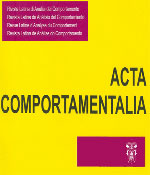Effects of task and delay in solving mathematical problems in children with and without ADHD
DOI:
https://doi.org/10.32870/ac.v19i1.28019Keywords:
Attention Deficit Hiperactivity Disorder (ADHD), self-control, delay, choice, reinforcementAbstract
Attention Deficit Hiperactivity Disorder (ADHD) has been related to self-control. In the present study, eight children were allocated to an “ADHD” group, while other six children were allocated to a “non ADHD” group. They were then submitted to five experimental sessions in which they had to solve math problems, according to one of two tasks. As in other studies with humans about effects of delay on choice, relative choice did not vary systematically with delay. Moreover, for the “ADHD” group, there were more fluctuations in preference between alternatives. The present results suggest caution in declaring that ADHD involves selfcontrol when delayed choice is used and open a discussion about the problems involved in using this model.Downloads
Download data is not yet available.
Downloads
How to Cite
Coelho Silva, R. L. F., Coelho, C., & Vasconcelos Da Silva, A. (2011). Effects of task and delay in solving mathematical problems in children with and without ADHD. Acta Comportamentalia, 19(1). https://doi.org/10.32870/ac.v19i1.28019
Issue
Section
Articles
License

<a rel="license" href="http://creativecommons.org/licenses/by-nc-sa/4.0/"><img alt="Licencia de Creative Commons" style="border-width:0" src="https://i.creativecommons.org/l/by-nc-sa/4.0/88x31.png" /></a><br />Este obra está bajo una <a rel="license" href="http://creativecommons.org/licenses/by-nc-sa/4.0/">licencia de Creative Commons Reconocimiento-NoComercial-CompartirIgual 4.0 Internacional</a>.






